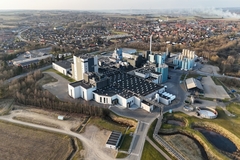
- Industry news
Industry news
- Category news
Category news
- Reports
- Key trends
- Multimedia
Multimedia
- Journal
- Events
- Suppliers
- Home
- Industry news
Industry news
- Category news
Category news
- Reports
- Key trends
- Multimedia
Multimedia
- Events
- Suppliers
Novozymes Hit by Pressured Bioethanol Industry, Food Enzymes Sales Down 1%

Sales of enzymes to the baking industry were on par with the same period of 2008, benefiting from the fact that demand for staple goods, such as bread, is more stable in a recession.

13 Aug 2009 Novozymes has reported that the global recession and a US bioethanol industry under pressure have impacted Novozymes’ sales growth negatively. Sales in the first half were up by 3% in DKK and down by 3% in local currency (LCY). Operating profit increased by 7%, raising operating profit margin to 19.3%. Expected 2009 sales growth in LCY is maintained at slightly positive. Full-year expectations for operating and net profit growth are also maintained, whereas the full-year free cash flow expectation is increased due to a lower investment level.
“2009 continues to be tough half way into the year. The markets remain uncertain, but we reconfirm our expectation of slightly positive growth in local currencies for the full year,” says Steen Riisgaard, President and CEO. “It’s only the recent US dollar development that is causing us to adjust outlook for sales growth in Danish kroner. We're expecting lower growth in costs for the full year than we were after the first quarter, which enables us to maintain expectations for growth in operating and net profit for the year.”
Enzyme Business sales increased by 2% in DKK in the first half, whereas sales in LCY were down by 4%. In particular, enzyme sales to the US ethanol industry, the animal feed industry, and the textile industry had a challenging first half. On a positive note, overall prices were stable in the first half of the year.
After the first half, sales of food enzymes were down by 1% in DKK and 6% in LCY. Sales of enzymes to the baking industry were on par with the same period of 2008, benefiting from the fact that demand for staple goods, such as bread, is more stable in a recession. Enzymes sold to reduce acrylamide in fried and baked goods also performed well in the period. Enzyme sales to the brewing industry in particular continued to be unfavorably impacted by lower raw material prices and reduced pressure on the breweries’ capacity utilization. Further, enzyme sales to the beverage alcohol industry were in a depressed mode resulting from an industry shift to raw materials requiring fewer or no enzymes.
Sales of feed enzymes were down by 7% in DKK and 14% in LCY after the first six months. There was a significant reduction in inventories at supplier level in the quarter, slightly higher than expected following stock building in the first quarter. However, volume demand for enzymes at the feed mills has been fairly stable over the period. The recently launched RONOZYME ProAct enzyme, providing enhanced digestibility of protein in soya diets for poultry, continued to perform very well.










